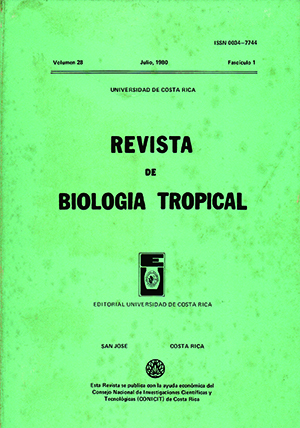Abstract
Neritina latissima from Río Pánica, Bahía Ballena, Costa Rica, exhibits a color pattern that clearly matches that of the substrate, which has high values of manganese (MnO2) not found elsewhere. Other nearby populations show no traces of this element and the substrate is mainly of a calcareous type. Qualitative and quantitative analyses of the shells and tissues of N. latissima, as well as of the substrate suggest that the coloration in the animals is the result of metabolic incorporation through food intake. The results also suggest that the process may be related to the observed smaller size of the individuals, as compared with individuals of other areas with a lower manganese content.References
Broderip, W. J. 1833. Characters of new species of Mollusca and Conchifera. Proc. Zool. Soc. London: 173-202.
Corella, R. 1978. Efectos de altos niveles de manganeso en la dieta sobre la función tiroidea, reproductora y el metabolismo de hierro en ratas. Facultad de Agronomía, Universidad de Costa Rica. Tesis de grado (Mimeografiado).
Gilreath, E. 1954. Qualitative analysis using semimicro methods. Mc Graw-Hill, Kogakusha, Tokyo. 287 p.
Keen, A.M. 1971. Sea shells o f tropical west America. Stanford University Press, Calif., 1064 p.
Lachica, M., L. Recalde, & E. Esteban. 1965. Métodos analíticos utilizados en la Estación Experimental del Zaidin. España. An. Edafol. Agrobiol., 24: 593 p.
Little, C. 1972. The evolution of kidney function in the Neritaceae (Gastropoda, Prosobranchia). J. Exp. Biol., 56: 249-261.
Valdez, Marta F. 1979. Variación en poblaciones naturales de Neritiruz latissima (Gastropoda: Neritidae) en Costa Rica. Sistema de Estudios de Posgrado, Universidad de Costa Rica. Tesis de grado. 98 p.
Zar, J.H. 1974. Biostatistical analysis. Prentice-Hall, N.J. 620 p.
##plugins.facebook.comentarios##

This work is licensed under a Creative Commons Attribution 4.0 International License.
Copyright (c) 1980 Revista de Biología Tropical


